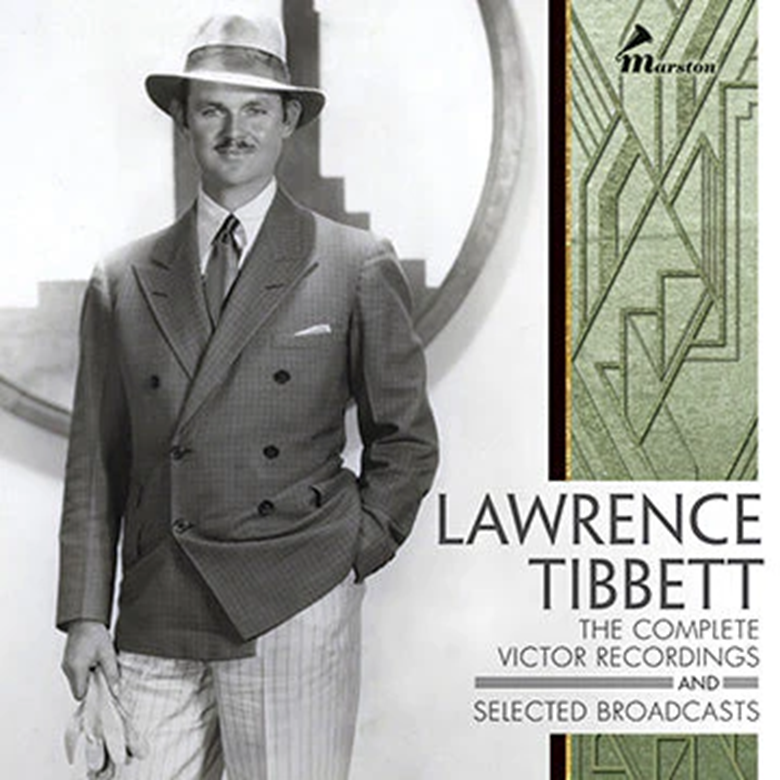Review - ‘The Complete Victor Recordings and Selected Broadcasts Lawrence Tibbett’
Rob Cowan
Friday, July 12, 2024
America’s greatest pre-war baritone commemorated by Marston

Many years ago I chanced upon an RCA Victrola bargain LP transfer of classic shellac recordings by the American baritone Lawrence Tibbett (1896-1960), a name unknown to me at the time but whose vibrant, dark-hued singing and theatrical flair had me hooked from the off. Tibbett’s life was filled with drama. His father was a part-time deputy sheriff, killed in a shootout with outlaw Jim McKinney in 1903. And his own career was both varied and meteoric. As well as being a Metropolitan Opera stalwart, Tibbett starred in numerous films (including The Cuban Love Song with the Mexican singer and actress Lupe Vélez), musicals, plays and radio shows. Once heard, his vividly histrionic singing is never forgotten: he was in the Chaliapin/Alexander Kipnis/Boris Christoff league, someone whose records stopped you in your tracks, pinned you to the wall with their explicit rhetoric and expressive power. No wonder millions were infatuated by him. But rather than offer you a run-down on his career – Conrad L Osborne does that and more for Marston’s copious and beautifully written 223-page booklet, which includes dozens of photographs of Tibbett in various roles, most of them previously unseen, even by collectors – I’d rather guide you through some of the most remarkable tracks from Ward Marston’s magnificent set of ‘The Complete Victor Recordings and Selected Broadcasts’.
The item that initially grabbed me most of all those many years ago was Carl Loewe’s setting of the Scottish ballad ‘Edward’, Tibbett, singing in English, intoning its drama with a level of conviction that he also brought to Verdi, especially as Iago in Otello (selections also feature in the set, where Tibbett’s malevolent Iago enrages Giovanni Martinelli’s piercing assumption of the title-role). There are various extant texts for ‘Edward’ that vie for supremacy (in Scots or English), ranging in the first line from ‘Why does your sword so drip with blood’ (or is it a knife?) to the closing salvo where Edward fires off accusations at his mother for counselling him to commit the murder of his father (or his brother?). Tibbett mixes versions (preferring a blood-drenched sword to kill the father) but his Anglo-Scots enunciation is so clear, his sense of outrage so uncompromising that he seems to be condensing a whole range of emotion into a mini-opera.
Various recordings of the song are included but for me the finest (taken from an appearance on The Chesterfield Hour in 1938) ratchets up the drama to fever pitch. Disc 8 (the disc I’d most recommend as a prime sampling of what’s on offer) also includes one of various featured recordings of Oley Speaks’s stirring ballad ‘On the Road to Mandalay’, music that sets a portion of Kipling’s 1890 poem ‘Mandalay’ from Barrack-Room Ballads, where Tibbett sings his own endearing if idiosyncratic version of ‘cockney’ English. Most, though not all, of the operatic inclusions stick to their native language. Rossini’s ‘Largo al factotum’ climaxes into a speedy Italianate patter-song – as virtuosic as any you’re ever likely to hear – while Tibbett’s majestic singing of Wotan’s Farewell (sung in German) is taken from Leopold Stokowski’s ‘symphonic synthesis’ of Wagner’s Die Walküre, recorded in 1934 with the Philadelphia Orchestra.
The largest-scale single work included is John Stainer’s 1887 oratorio The Crucifixion, a recording where Tibbett is joined by the superb American tenor Richard Crooks, supported by Mark Andrews playing the organ and the Trinity Choir under Clifford Cairns. Osborne and others underline the origins of this modest but effective work as being among the Bach Passions but I find a more likely bloodline in the choral works of Mendelssohn (try disc 2 track 3, ‘Processional to Calvary … Fling wide the gates’). You couldn’t wish for a more resplendent, vocally impressive rendition than this 1929 classic, a performance that gives the work a warmth of utterance denied it by most other recordings.
The Crucifixion thrives on what one might term ‘old-fashioned’ singing, but what about the vocal equivalent of ‘blacking up’, something that back in the day was deemed affectionate and not in the least bit discourteous? Tibbett’s interpretations of Porgy and Bess highlights (with Helen Jepson) and various songs focusing on people of colour do admit an element of what one might term ‘racial’ caricature. I mention this only by way of a gentle warning, although speaking personally I find nothing at all offensive about any of these songs or interpretations. I’m sure that Tibbett and his musical collaborators would have been horrified to think that anyone might find them disrespectful.
The roll call of notable recordings programmed by Marston is far too substantial to even hint at in detail. Of the featured arias, ‘Eri tu’ from Verdi’s Un ballo in maschera fits Tibbett’s commanding baritone to perfection (whichever version you choose to audition). There are Handel arias, including a very Caruso-like ‘Ombra mai fù’ and a touchingly expressive ‘Where’er you walk’, and on the last disc ‘Suomi’ (‘Song of Finland’), where Tibbett can be heard alongside Kirsten Flagstad, Karin Branzell and Lauritz Melchior with the NBC Concert Orchestra under Eugene Goossens. I would rate this set on a level with Marston’s McCormack and Chaliapin collections (2/19, 9/19). It is surely among the most valuable historic vocal releases of the CD era, a true labour of love, superbly produced and a potential prize for any discerning collector’s shelves.
This review originally appeared in the August 2024 issue of Gramophone. Never miss an issue of the world's leading classical music magazine – subscribe to Gramophone today













